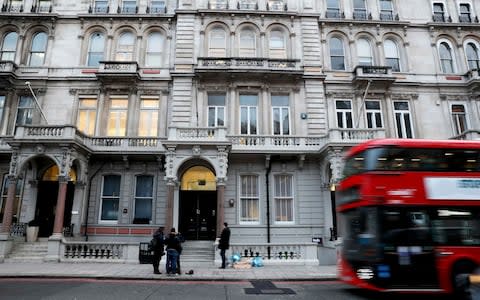Christopher Steele wins libel case over Trump campaign dossier

A British former spy has been exonerated by a US court for producing a dossier which made claims about the Trump campaign and its links to Russia.
Christopher Steele and his intelligence firm, Orbis, were sued by three Russian oligarchs - Mikhail Fridman, Petr Aven and German Khan – for libel, after they were named in the dossier.
The dossier, commissioned by a Democrat research organisation, contained explosive allegations against Donald Trump and his campaign and was leaked and published in early 2017.
The three Russians, who co-founded Russia’s largest private bank, sued for libel, but Judge Anthony Epstein, sitting in the Washington DC superior court, threw out their case.
He ruled that the dossier was not knowingly inaccurate, and therefore protected by the First Amendment because he acted “in furtherance of the right of advocacy on issues of public interest”.

Judge Epstein’s decision in the lawsuit did not consider whether the dossier was accurate or inaccurate.
But his conclusion offered the first authoritative response to questions that have been raised by Mr Trump’s Republican allies about the propriety of Mr Steele discussing the dossier with reporters prior to the 2016 election.
Mr Trump argues that Robert Mueller’s investigation into Russian meddling in the election originated with the Steele dossier, which Mr Trump has dismissed as “garbage”.
Bruce Ohr of the “Justice” Department (can you believe he is still there) is accused of helping disgraced Christopher Steele “find dirt on Trump.” Ohr’s wife, Nelly, was in on the act big time - worked for Fusion GPS on Fake Dossier. @foxandfriends
— Donald J. Trump (@realDonaldTrump) August 14, 2018
But Judge Epstein found that it contributed to an issue of public interest – namely the “possible Russian interference within the 2016 election” – and so was valid.
He said that Alfa Bank, founded by the three Russians, failed to provide evidence that Mr Steele acted with “actual malice” - that is, that he “knew the information was false or acted with reckless disregard for its falsity.”
He added: “The Steele dossier generated so much attention and interest in the United States precisely because its content relates to active public debates here.”
Alfa Bank and its three founders played a fairly limited role in the dossier, describing the men as providing informal advice to President Vladimir Putin on foreign affairs.
Judge Epstein found that Mr Steele was “engaging in speculation” to the extent that the dossier suggests Alfa was involved in Russia’s election interference.
The plaintiffs’ lawyer seized on that comment, writing in a statement that they are “pleased that the Court agreed that we have adequately proved Mr Steele’s negligence in making unsupported accusations that our clients had something to do with alleged efforts to interfere in the 2016 election—which they did not.”
Alfa Bank has brought similar defamation suits against Fusion GPS, the opposition-research firm that hired Mr Steele, and BuzzFeed, which published the dossier in full in January 2017. It is unclear whether those suits will face a similar fate.

